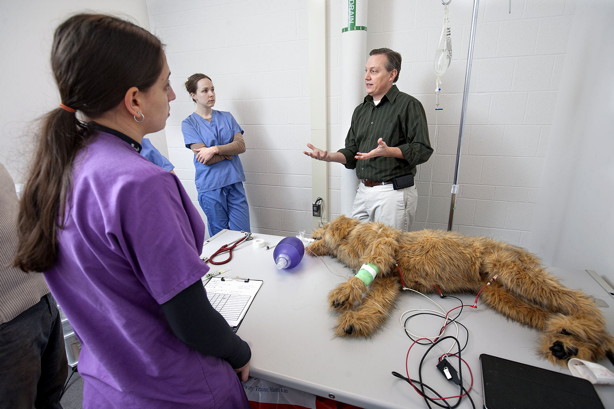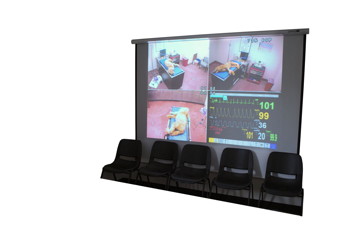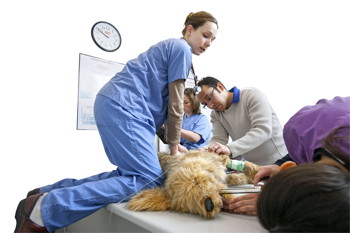RESEARCH SPOTLIGHT

Dan Fletcher, assistant professor of emergency and critical care, with his robotic dog in the new simulation center's exam room.
World's first vet simulation center uses robo-pets
College of Veterinary Medicine. Its new, advanced pet simulators are allowing the simulation learning model to spread throughout the veterinary curriculum and paving the way for other institutions to follow suit.
Cornell's new simulation center includes two fully equipped exam rooms, two rooms for live video-feed observation and debriefing, and space for storage and developing new models, like a new robotic cat and a more advanced robotic dog.
"Simulations like this have been used to teach human doctors for decades," says Daniel Fletcher, assistant professor of emergency and critical care (ECC), and developer of the pet simulators. "The idea is to bridge preclinical lecture learning and actual clinical experience, letting students practice applying what they've learned in a safe setting before the stakes get high. The new center gives us much more room to work with."

A screen in the debriefing theater. See larger image
In the 10-minute simulations, a small student team collects basic patient information from the robotic dog or cat, assesses, plans and treats. The students can use a full crash cart, medical supplies, defibrillator and other tools to take the robo-pet's pulse, listen to heart and lung sounds, insert catheters and hook up monitoring devices to get feedback orchestrated through Fletcher's software. Other students watch in the observation room, then all meet in the debriefing theater with a big projector screen split four ways (three exam room camera angles and the patient monitor data) to watch recordings and debrief.
The center is part of a greater plan to form a clinical skills complex Ð a self-paced multistation lab open 24/7. Students will have access to direct hands-on practice with such basic skills as suturing on skin models or putting catheters into fake limbs before labs or clinics.
First-year students now practice listening to heart and lung sounds on the robo-dog and cat. Second- and third-year students started performing scenarios in required core classes this year. Students role-playing with actors in the required client communications class now get a mock patient thrown in the mix. They take cases from start to finish and juggle assessing a patient while communicating with technicians, clients and other clinicians in the same room.

Veterinary students conduct a simulated emergency exam on a robotic dog. See larger image
ECC specialist Gretchen Schoeffler and an ECC resident are offering a new ECC course this spring and then will evaluate simulation-learning effectiveness. Fletcher also is developing new simulation-based tools for the clinical competency assessments students must complete before earning a DVM degree.
Fletcher, who has brought his robo-dog to schools across the country and around the world, is now building a more advanced model, code named "Butch." Butch will run with inexpensive, off-the-shelf electronic components and sport a more realistic airway, a soft abdomen compartment, articulating joints, more areas for catheters, more space inside the body and a more realistic overall feel.
"No other schools are using this kind of simulation yet," Fletcher says. He also is working with collaborators on a new simulation toolkit for veterinary education, which will include an open-source software platform with affordable hardware that can be shared with other institutions. Carly Hodes '10, MBA '14, is a communication specialist at the College of Veterinary Medicine.
Carly Hodes '10, MBA '14, is a communication specialist at the College of Veterinary Medicine.